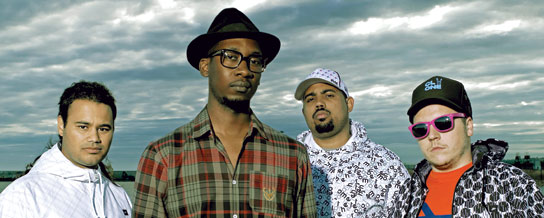Buraka Som Sistema: Kuduro Masters
Kuduro is Portuguese slang for “hard ass,” which is what you stand to obtain if […]

Buraka Som Sistema: Kuduro Masters
Kuduro is Portuguese slang for “hard ass,” which is what you stand to obtain if […]

Kuduro is Portuguese slang for “hard ass,” which is what you stand to obtain if you dance long enough to the pumping Angolan house strain of the same name. Judging by the videos on YouTube–including one for Portuguese crew Buraka Som Sistema’s “Sound of Kuduro”–you’ve got a long way to go before that tight ass is yours; the clips showcase kuduro’s fast ’n�� furious rubber-legged breakdancing, including such show-stopping moves as a guy hitting himself in the face with his foot and a kid slapping himself before keeling over in a dead man’s fall.
“Kuduro all started as a dance movement,” explains Buraka’s soft-spoken MC Kalaf Angelo. “To understand kuduro you need to understand the whole story about Africa. To get an emotion out of somebody in Africa is really hard, so dancers need to do some crazy stuff like break an arm or a leg to receive applause. For them to go to the limit is normal–the whole society is pushed to the limit.”
Buraka Som Sistema–a DJ/production team helmed by Rui “DJ Riot” Pité, João “Lil’ John” Barbosa, and Andro “Conductor” Carvalho–doesn’t make kuduro per se, but it would be impossible to write about them without mentioning the genre. They’ve been championing the music–which is popular in the African expat communities of their native Lisbon–since 2005, when they began making edits of kuduro tracks to play in their DJ sets. It’s not a weird fit. Like baile funk and kwaito, kuduro is bass-driven electronic dance music; underneath the incessant, harsh patter of the MCs and the unique pattern of the drums, it’s like tribal house on steroids.
“When kuduro first started it was very clowny and stupid,” explains straight-talking João. “There was a big wave of kuduro in the end of the ’90s and then it had the fastest fade out ever. But to be honest, while no one was listening to it there was a huge development in the instrumental side of it; DJs like Znobia were really pushing the genre. When we started listening to the new stuff that guys like him were developing we thought, ‘We definitely need to do something with this.’”
What BSS ended up creating were electro-house jams that maintain kuduro’s raw feel and dancefloor urgency while adding better production, DJ-friendly structure, and more developed melodies. While they caught the ears of DJs like Diplo and Sinden, they were also developing a live show that features plenty of drumming and a cadre of rappers and dancers.
“When we play live, we don’t want the songs to be there for nothing; every song has to make sense,” explains Kalaf. “The Prodigy shows were impressive for me–we like that energy and we want to produce that energy. We kind of represent this new face of Africa,” he continues. “Even if our songs don’t take you there lyrically, the whole attitude takes you there.”

